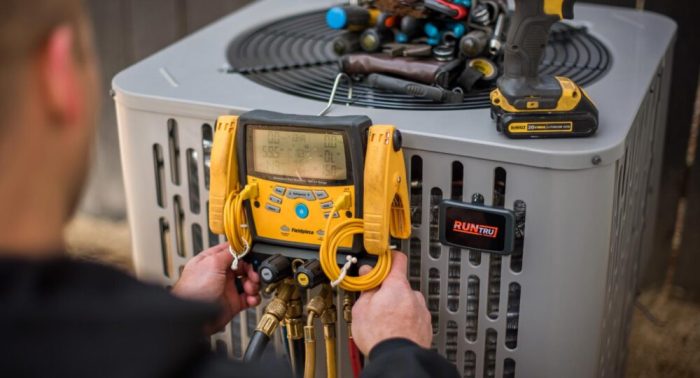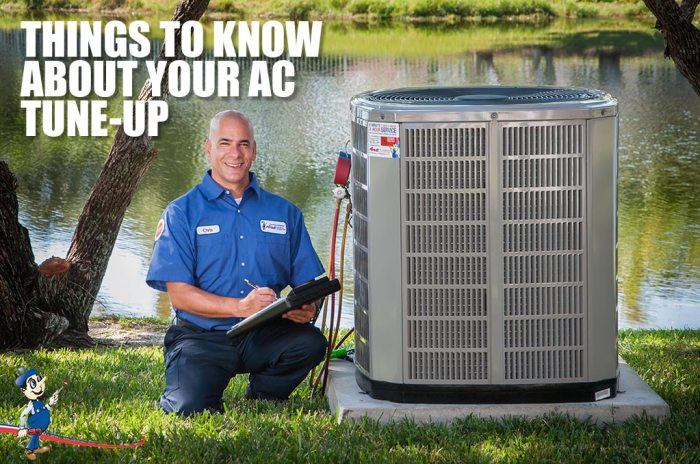As ac unit tune-up takes center stage, this opening passage beckons readers with casual formal language style into a world crafted with good knowledge, ensuring a reading experience that is both absorbing and distinctly original.
Regular tune-ups for AC units are crucial for their optimal performance and longevity. In this comprehensive guide, we delve into the importance of AC unit tune-ups, signs indicating the need for maintenance, components checked during a tune-up, DIY maintenance tips, and more.
Let's explore the world of AC unit tune-ups together.
Importance of AC Unit Tune-Up

Regular tune-ups are essential for AC units to ensure they are running efficiently and effectively. Scheduling a tune-up can help prevent unexpected breakdowns and costly repairs in the future. Additionally, a well-maintained AC unit can provide better indoor air quality and lower energy bills.
Benefits of AC Unit Tune-Up
- Improved Energy Efficiency: A tune-up can help the AC unit run more efficiently, reducing energy consumption and lowering utility bills.
- Extended Lifespan: Regular maintenance can help extend the lifespan of the AC unit, saving you money on premature replacements.
- Enhanced Performance: A well-tuned AC unit can provide better cooling performance, keeping your home comfortable during hot weather.
- Preventive Maintenance: Tune-ups can help identify and address minor issues before they escalate into major problems, ensuring the unit operates smoothly.
Signs That Your AC Unit Needs a Tune-Up
Regular maintenance of your AC unit is crucial to ensure optimal performance and longevity. Here are some common signs that indicate your AC unit may be in need of a tune-up:
Unusual Noises or Odors
Strange noises such as grinding, squealing, or banging coming from your AC unit can be a red flag that something is amiss. Similarly, foul odors like musty or burning smells should not be ignored, as they could indicate issues that require professional attention.
Reduced Cooling Efficiency
If you notice that your AC unit is no longer cooling your home as effectively as it used to, it could be a sign that it needs a tune-up. Poor cooling performance may be caused by factors such as clogged filters, refrigerant leaks, or faulty components that need to be addressed by a qualified technician.
Components Checked During an AC Tune-Up
During an AC tune-up, a technician will inspect various key components of your air conditioning system to ensure optimal performance and efficiency.
Air Filters
Regularly cleaning or replacing air filters is crucial during an AC tune-up. Clogged or dirty filters can restrict airflow, reduce efficiency, and lead to increased energy consumption. It is recommended to check and replace filters every 1-3 months, depending on usage.
Refrigerant Levels
Checking refrigerant levels is essential to ensure that your AC unit is cooling effectively. Low refrigerant levels can indicate a leak in the system, which can impact the overall performance and lifespan of the unit. A technician will check for leaks, top off refrigerant if necessary, and ensure the system is functioning properly.
Condenser Coil
The condenser coil plays a crucial role in releasing heat from your home
. During a tune-up, a technician will inspect the condenser coil for any dirt, debris, or damage. Cleaning the coil helps improve efficiency and cooling performance, as a dirty coil can lead to reduced airflow and strain on the system.DIY AC Unit Maintenance Tips

Regular maintenance is key to ensuring your AC unit functions efficiently and lasts longer. Here are some simple DIY maintenance tips to help keep your AC unit in good condition.
Cleaning Vents and Ensuring Proper Airflow
Proper airflow is essential for your AC unit to cool your home effectively. Here are some tips for cleaning vents and ensuring proper airflow:
- Regularly clean and vacuum the vents to remove dust and debris that can block airflow.
- Check for any obstructions around the vents, such as furniture or curtains, that may be restricting airflow.
- Ensure that the vents are not blocked by any objects that could hinder the flow of air.
Importance of Regular Cleaning and Upkeep
Regular cleaning and upkeep of your AC unit can help prevent breakdowns and extend its lifespan. Here are some maintenance tasks you can perform:
- Change or clean the air filters every 1-3 months to ensure proper airflow and prevent dust and debris buildup.
- Inspect the outdoor unit for any debris, such as leaves or branches, and clear them away to prevent airflow restrictions.
- Check the condensate drain line for clogs and clean it out to prevent water damage and mold growth.
Epilogue

In conclusion, ensuring your AC unit receives regular tune-ups is key to keeping it running smoothly and efficiently. By following the tips and guidelines provided in this guide, you can prolong the lifespan of your AC unit and avoid unexpected breakdowns.
Stay proactive in maintaining your AC unit to enjoy cool and comfortable indoor environments year-round.
FAQ Section
What are the benefits of scheduling a tune-up?
Scheduling a tune-up for your AC unit can help improve its efficiency, reduce energy costs, prevent breakdowns, and extend its lifespan.
How often should I schedule a tune-up for my AC unit?
It's recommended to schedule a tune-up for your AC unit at least once a year to ensure optimal performance.
Can I perform DIY maintenance on my AC unit?
While some maintenance tasks can be done by homeowners, it's advisable to have a professional technician perform a comprehensive tune-up to address all aspects of the unit.
